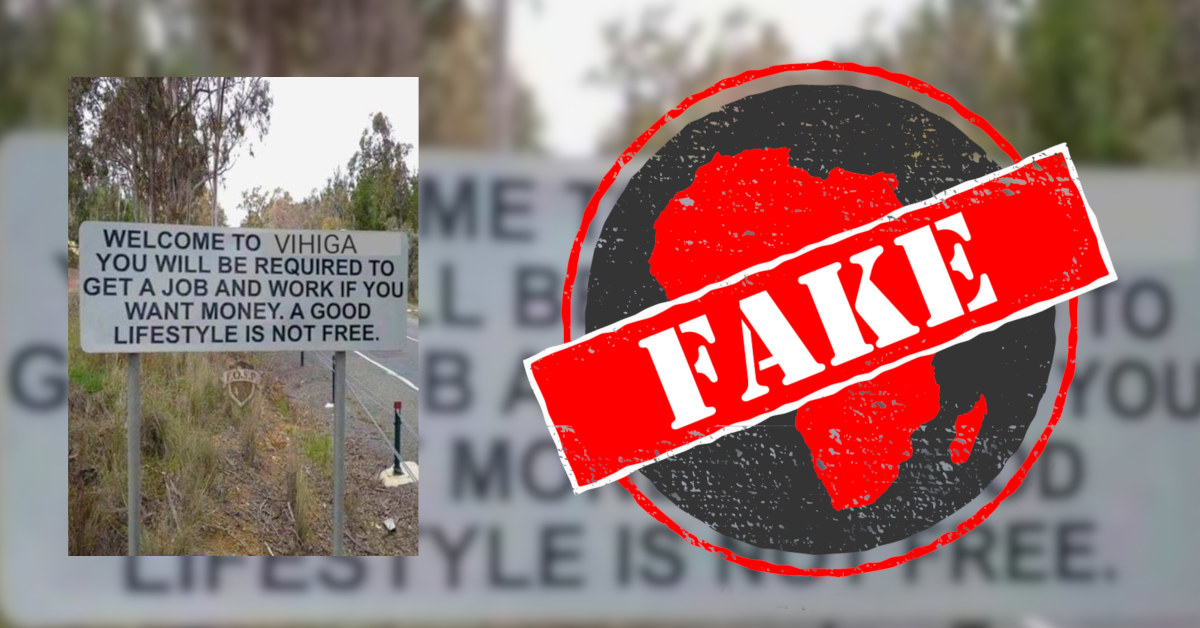A Facebook user shared a sign allegedly spotted on a road to Vihiga county in western Kenya.
The sign, flagged as possibly false by Facebook’s fact-checking system, reads: “Welcome to Vihiga. You will be required to get a job and work if you want money. A good lifestyle is not free.”
The user captioned it: “In my home County, the message is very clear.”
Another user shared the photo with the caption: “‘Counties’ are now making it clear.”

But there are clues that the sign might be fake.
The font size of the text is not uniform. The word “Vihiga” appears to be slightly bigger and less bold than the rest of the sentence.
The word also appears to be against a different colour background, a slightly creamier white than the rest of the sign. It looks like the photo was manipulated - photoshopped.
A reverse image search quickly leads to two articles that seem to show the original version of the image. Here the sign reads “Welcome to Australia”.
But this image was also digitally doctored. According to fact-checking site Snopes the image was first published by Freedom Of Speech Productions (FOSP), a conservative Facebook page that was affiliated with the Australian Tea Party.
There is a watermarked FOSP logo visible on the photo of the sign.
According to Snopes, the image was posted on 10 April 2016 on the FOSP Facebook page (now disabled) which said it used “humorous artistic pieces” to “expose the vile and delusional left-wing agenda”.
The FOSP made it clear that the sign wasn’t real, according to a screenshot of the original post on their page.
The image appeared to target immigrants and migrant workers in Australia and went viral. But there is no evidence any such sign was ever put up on the side of a road, in either Australia or Kenya. – Dancan Bwire
The sign, flagged as possibly false by Facebook’s fact-checking system, reads: “Welcome to Vihiga. You will be required to get a job and work if you want money. A good lifestyle is not free.”
The user captioned it: “In my home County, the message is very clear.”
Another user shared the photo with the caption: “‘Counties’ are now making it clear.”

Clues that sign not original
But there are clues that the sign might be fake.
The font size of the text is not uniform. The word “Vihiga” appears to be slightly bigger and less bold than the rest of the sentence.
The word also appears to be against a different colour background, a slightly creamier white than the rest of the sign. It looks like the photo was manipulated - photoshopped.
Original photo also hoax
A reverse image search quickly leads to two articles that seem to show the original version of the image. Here the sign reads “Welcome to Australia”.
But this image was also digitally doctored. According to fact-checking site Snopes the image was first published by Freedom Of Speech Productions (FOSP), a conservative Facebook page that was affiliated with the Australian Tea Party.
There is a watermarked FOSP logo visible on the photo of the sign.
According to Snopes, the image was posted on 10 April 2016 on the FOSP Facebook page (now disabled) which said it used “humorous artistic pieces” to “expose the vile and delusional left-wing agenda”.
The FOSP made it clear that the sign wasn’t real, according to a screenshot of the original post on their page.
The image appeared to target immigrants and migrant workers in Australia and went viral. But there is no evidence any such sign was ever put up on the side of a road, in either Australia or Kenya. – Dancan Bwire
Republish our content for free
For publishers: what to do if your post is rated false
A fact-checker has rated your Facebook or Instagram post as “false”, “altered”, “partly false” or “missing context”. This could have serious consequences. What do you do?
Click on our guide for the steps you should follow.
Publishers guideAfrica Check teams up with Facebook
Africa Check is a partner in Meta's third-party fact-checking programme to help stop the spread of false information on social media.
The content we rate as “false” will be downgraded on Facebook and Instagram. This means fewer people will see it.
You can also help identify false information on Facebook. This guide explains how.


Add new comment